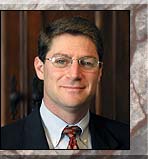Case o' The Week: Zavala / Carty En Banc October 6, 2006


The Booker rubber finally hits the road as the Ninth wrestles with key sentencing issues in the Section 3553(a) era. A fascinating oral argument in the most important en banc case of the year. Download oral argument here.
Players: Masterfully argued by Sidley Austin partner Jeff Green (left) and CJA Counsel Dennis Charney (right). The panel included (in no particular order), Judges Reinhardt, Berzon, Paez, Thomas, (Chief Judge) Shroeder, Wardlaw, McKeown, Gould, Silverman, Bybee, Kozinski, Kleinfeld, Bea, Tallman, and Rymer.
Facts: Zavala was a drug dealer who got a 30-year sentence, down from “life” guidelines. The district court judge started with the guideline sentence, however. See blog here. Carty committed a sex crime and got low-end of the guidelines; the judge didn’t articulate the Section 3553 factors. See blog here.
Issue(s): The Ninth took the cases en banc, and invited amicus briefing on a half-dozen issues. See blog with questions here. The two big questions: is a guideline sentence presumptively reasonable? And, must a district court repeat all Section 3553(a) factors at sentencing, and articulate the reasons for the sentence – even for an in-guideline sentence?
Predicted Outcome: Spectators from the east side of Courtroom 4 have a prediction: e-mail me if curious.
Of Note: The biggest surprise of the argument was the conciliatory tone of the Deputy Solicitor General of DOJ, Michael Dreeben. (By the way, what a nice gesture from Justice – sending out a hired gun who has argued sixty-four Supreme Court cases, including Koon. (Just in case the 9th had forgotten about SCOTUS). Gestures like this, however, might backfire in the independent West.)) Nonetheless, one must concede that Mr. Dreeben argued eloquently for the government.
In any event, listen to the oral argument – one would be hard-pressed to hear Dreeben defend the “presumption of reasonableness” for a guideline sentence. The government seems more concerned with retaining the ability to attack out-of-guideline sentences on appeal – demanding “compelling” reasons for such sentences. Maybe it was just the government’s back-door way of seeking the same “‘reasonableness” presumption, but one gets the sense that counsel on all sides were fighting hard for the middle ground (and for the “moderate” swing judges) in this case.
Some of the most thoughtful – and most difficult – questions came from Judge Kozinksi, who pressed both sides for plain-spoken answers. Kozinski wondered if the Defense position is that a district court judge can “pierce” the guidelines and look at the reasonableness of the Commissions’ conclusions for any given guideline? (Like the inequitable “crack” guidelines). As dearly as we in the defense bar would love to pierce (and prod, and sever, and shred) the guidelines, Jeff Green was wary of this question – key moderate judges (and Congress, and SCOTUS) may not be too keen on the idea.
From Mr. Dreeban, Kozinski pressed – several times – for the precise text of § 3553(a) that directs that the guidelines factor gets greater weight. (Ed. note: it doesn’t exist). Dreeban fumbled with “organizational principles” and the “Commission’s needs” . . . i.e., he never answered the question. Kozinski’s key question – and it is a central one – is how much weight is a district court to give the guidelines in any given, individual case, and how will the Ninth review that decision?
Judge McKeown was also an active participant – she’s wrestling through some of the thorny practical aspects of the case. For McKeown, the appellate standard of review for a Booker sentence was a key question.
Judges Wardlaw and Reinhardt both emphasized Justice Breyer’s actual text in Booker; nothing in the remedial opinion said anything about greater weight for the guidelines factor. Reinhardt delivered the most memorable line, mock-admiring Breyer’s skill in convincing other Justices to abandon the holding that they had just reached in Justice Steven’s constitutional opinion, and to join him in the remedial Booker decision.
Another humorous moment was Chief Judge Schroeder’s invitation to Mr. Dreeben to quantify on a scale of 1 to 10 the weight the guidelines should play in the § 3553(a) analysis. After his artful dodge and refusal to do so, the Chief (a bit wryly) suggested that he give the Court “a range.”
For Further Reading: To hear the oral argument, navigate to: http://www.ca9.uscourts.gov/ca9/media.nsf/Media%20Search ?OpenForm&Seq=1 . It seems that all sentencing appeals have been stayed pending the outcome of Zavala/Carty -- it'll be an uncertain Fall, as practioners wait to see the final (hopefully) word on Booker practice in the Ninth.
Steven Kalar, Senior Litigator N.D. Cal. FPD. Website at www.ndcalfpd.org
.

0 Comments:
Post a Comment
<< Home